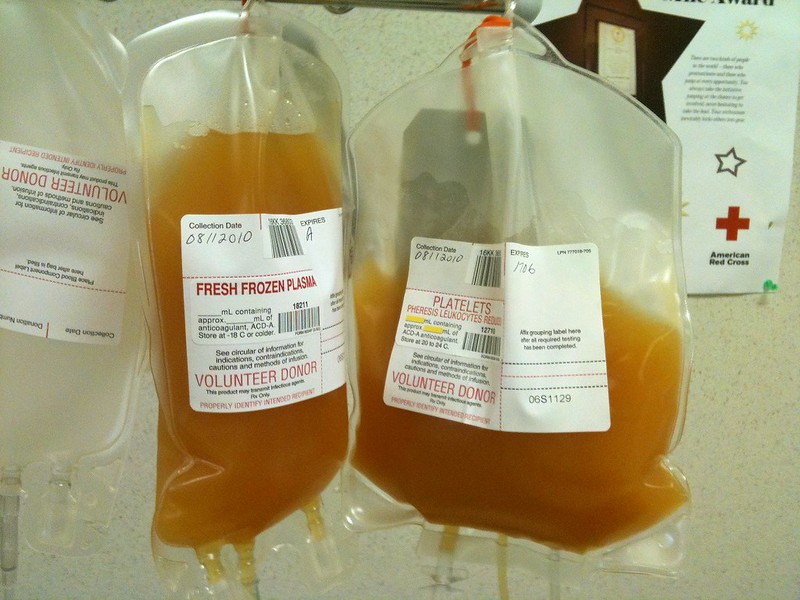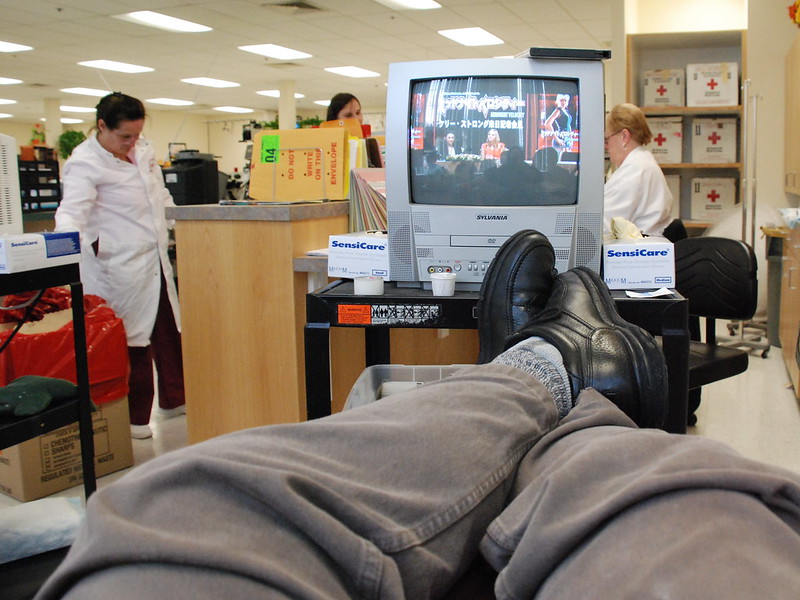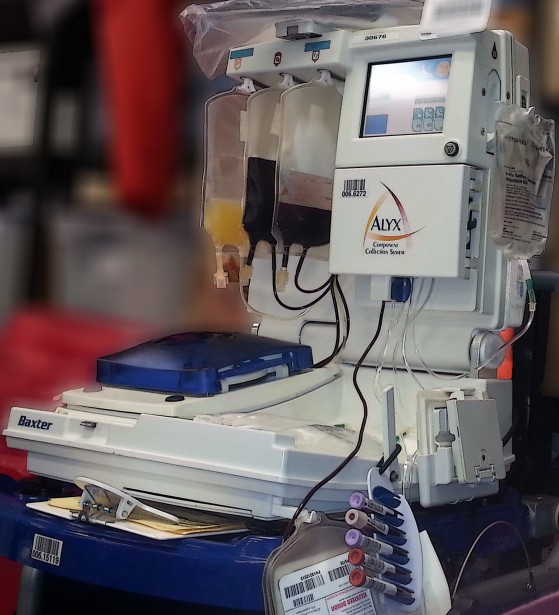Despite Covid-19, Meet The Man Saving Cancer Patients With His Platelet Donations
Plasma donation to treat COVID-19 patients has been much talked about, however, major hospitals like Tata Memorial Cancer Hospital are facing a shortage of platelet donors too.

Suren Abreu, an environmental activist and feminist, was first introduced to platelet donation in 2002 when he was asked by a social worker friend to donate them for a child with blood cancer, though, it would be years before he became a regular.
Back then, due to a lack of awareness, very few would come forward or know about the necessity of platelet donation to treat cancer patients.
“I became a regular platelet donor in 2014 when I donated for another child with cancer, and the doctors at Tata Memorial Cancer (TMC) Hospital, Parel, asked whether I’d consider regularly donating since I had a very good platelet count. I was 47 years at the time and had been a regular blood donor from 1985 when I was 18 years old,” says Suren in an email interview with The Better India.
He adds, “I switched to platelet donation because platelets are more difficult to access, and cancer patients on chemotherapy often require them. Also, I liked the idea that unlike blood donation, which needs a three-month gap between donations, I could donate platelets every two weeks.”
To date, the 53-year-old from Kalyan in Thane district, Maharashtra, has “donated blood around 117 times, and platelets around 95 times”. And even the pandemic hasn’t deterred him from his regular visits to TMC.

Recalling his first time donating platelets, he says, “In 2002, the older machines were in use, so I had a needle in both arms, one for the outflow [draw] and one for the inflow [return]. The doctors were friendly and willing to explain any part of the procedure about which I was curious. I never met the child, but I met the father – a poor man, who was so grateful that I was embarrassed.”
Medicine underwent a sea change in the next decade; as Suren says, “In 2014, I was asked by another friend if I could donate platelets for his 11-year-old nephew at TMC Hospital. Dr Sneha tested my veins, took my sample and led me through the procedure. Some friends and I were called the next day on 1 March 2014, since the blood testing takes some time. The new machines have a single needle with separate tubes to control the draw and return. The experience, as in the earlier one, was exhilarating. The thought that such a simple act could help a child live was mind-blowing.”
But the best part about donation for Suren was “being told that a single adult donation could benefit two adult or three child recipients. It made my weight and high platelet count seem so much more worth it”.
A Dearth of Donors During Lockdown
Suren, who has plenty of experience in platelet and blood donation, explains the simple procedure. “The extraction site is cleaned thoroughly. A tourniquet, usually a blood-pressure cuff attached to the machine, is wrapped around the upper arm. A trained doctor then pierces the vein, and once a good flow is established, the cannula is taped down so that the needle doesn’t shift. This is because the needle has to stay in place for around an hour, and a shift could cause flow problems. The machine extracts and replaces the blood in short pulses, during which a centrifuge fractionator separates the platelets from the blood. After a predetermined time, which varies depending on the height, weight, and platelet count of the individual, the machine beeps. Once the blood is returned to the individual, the doctor removes the needle from the vein and applies a cotton pad which has to be kept pressed for around 5-10 minutes. After some time, during which biscuits and coffee are given as part of the protocol, the extraction site is observed, and a tape with a small wad of cotton is applied to ensure no bleeding.”
View this post on Instagram
Suren mentions that the doctors, social workers, and other staff at the Apheresis Centre in TMC Hospital are friendly, warm and always ready to answer questions and assuage fears. “For a nervous first-timer, they will stand with the donor to help distract and calm the person. They even issue certificates of appreciation,” he says.
However, during the pandemic, Suren was stuck outside the state for 14 weeks. “A constant thought was the missed donation dates. I knew there would be a need because, despite the lockdown restrictions, people on chemotherapy were being allowed and would have to continue their therapy. When I returned home, I discovered that the situation was grim as many regular donors had stopped coming either out of fear or because travel was difficult. So I formed a small group of donors, arranged for transport and letters from TMC Hospital to validate our travel. We started donating in July 2020, when travel restrictions were slightly eased. The stock kept fluctuating, and in March this year, when the second wave was beginning to rise, we were told on one of our visits that only 10 units remained in storage,” says Suren, who has donated platelets 18 times since July 2020.
Bhavna Jaiswar, 29, working with TMC for more than two years as a coordinator who arranges for volunteer donors, says, “Suren is a regular platelet donor whom I coordinate with. During my tenure, he has donated platelets over 50 times.”
View this post on Instagram
She adds, “We have a daily requirement of 20-25 donors. Each single donor platelet bag can help two adult patients or four children. But during the pandemic, our outpatients are fewer. So, every day we try to ensure at least 10 donors.”
“During the lockdown, we kept calling the donors as there was a severe shortage. Our voluntary donors were very helpful as travel was restricted. They would arrange for cabs,” says Bhavna, who also arranged for webinars to spread awareness about donation last year.
“TMC is one hospital which sees people coming from different states like Uttar Pradesh, Kerala, Assam, etc. Many don’t know where to arrange platelets and blood from. So, the requirement of platelets here is very high,” she says.
Saving Cancer Patients, One Day At A Time
Blood is broken down into four components — white blood cells (WBC), red blood cells (RBC), platelets and plasma. Platelets, which are the acellular part of a cell, are used to stop bleeding in the body. “But chemotherapy cannot differentiate between good cells and bad [cancer] cells and suppresses the bone marrow where all the cells are manufactured. As a result, the cancer patients have a low platelet count, low RBC and WBC. If the count goes below a certain level, in most cases below 10,000, the patient has an increased tendency to bleed. Internal bleeding in these cases is hard to decipher, making platelet transfusion the need of the hour,” says Dr Gourav Bain, 30, who has been working at TMC for almost four years.
The consumption of platelets in every patient is different, depending on the type of cancer they have.
Dr Gourav explains, “Platelet donation processes 3-4 litres of the donor’s blood. The cell separator extracts the blood, and the centrifugation board retains the platelets from the blood while the remaining blood is injected back. This process takes approximately 70-80 minutes.”
Donors enjoy listening to music, watching movies during this time.
“We can separate platelets from whole blood that is donated, but we get a lot more platelets from single donor platelets. One single donor platelet collection would be equivalent to six to eight units of platelets collected from whole blood donations. While blood can be stored for 42 days, platelets can be stored only for five days before it must be transfused to the patients,” Dr Gourav says.
He adds, “Every year, we get 50,000 to 60,000 patients registering with us. This is over and above the patients coming for follow-ups. With the number of COVID-19 cases rising, our stock varies daily. But we have around 40 patients needing transfusion daily. Pre-covid times, this number would be as high as 50.”

Another donor, who worked at TMC in the early 2000s and said he also donated platelets around 100 times, is Dr Praveen Clement, 45, who now works as the Transplant Coordinator with Marrow Donor Registry India.
“This is not a painful procedure,” he says, adding, “Yet, the donor pool for platelets is less than blood donors because of lack of awareness.”
He adds, “During the lockdown, donors were sceptical about their own safety. But we do assure them about the safety measures.”
How to Become a Platelet Donor (with inputs from doctors and experts):
- There are no dietary restrictions/requirements to become a donor.
- Firstly, visit the Apheresis Centre of the desired Blood Bank — TMC, Kokilaben hospital and Hinduja hospital in Mumbai.
- A physical check of your arm veins to see their breadth and strength is conducted. If that is satisfactory, your weight will be taken, and a small droplet of blood taken from your fingertip to check your haemoglobin level.
- A person who wants to donate platelets has to be between 18 and 55, above 50kg in weight, have good vein strength (to sustain a needle for about an hour), a haemoglobin level of 12.5 g/dl or more.
- A complete blood and health analysis are done before a person can become a donor. For this, you may have to make two trips to the hospital.
- Then, a small sample of blood is taken from the crook of your elbow for further testing. The sample is tested for HIV, Hepatitis C, Hepatitis B, syphilis, malaria, major diseases that can be spread by blood, and the CBC (Complete Blood Count), which includes platelet count.
- TMC also monitors donor’s drug intake, recent tattoos or any condition that a donation could worsen.
- A healthy person has a platelet count between 1.5lakh and 4.5 lakh per microlitre. Once the test results are in and cleared, the person can start donating regularly.
- The body takes two to three days to replenish the number of platelets within the donors.
- Donors can’t donate blood and platelets simultaneously, but alternately they could, though that would reduce the number of times they could donate platelets.
- A gap of three months needs to be maintained for blood donation, while the gap for platelet donations is just two weeks. If a platelet donor donates blood, they would have to wait for at least two months before donating platelets again.
- TMC also issues letters to allow donors to travel for donations during lockdowns. Suren says he and his group of donors have not experienced any difficulty at the toll nakas or with the police so far.
- There are no dangers to platelets donations. Dr Gourav adds, “At no point does your blood come in contact with the machine. It stays within the tubings of the sterilised kit, which is discarded after every use.”
- If you have taken the COVID-19 vaccine and would still like to donate platelets, Dr Praveen says you can do so one month after the second dose.
- If you have been infected with COVID-19, Dr Praveen adds the deferral period is around three months after recovery.
“TMC is privileged to have people like Suren Abreu who have been donating here for decades now. Some people have donated more than 300 times, even during torrential downpours. These donors don’t even know who their platelets are going to but are still willing to help,” Dr Gourav says.
“The best part about donating blood or platelets is the awareness that some unknown person in need will get a new chance at life. I love donating platelets because the frequency means that with just a little more commitment, I can touch so many more lives,” Suren says, adding that he has added two new blood donors and four new platelet donors to his group of regular donors.
To become a platelet donor at Tata Memorial Cancer Hospital, Mumbai, call – 9869122255.
(Edited by Vinayak Hegde)
This story made me
- 97
- 121
- 89
- 167
Tell Us More
We bring stories straight from the heart of India, to inspire millions and create a wave of impact. Our positive movement is growing bigger everyday, and we would love for you to join it.
Please contribute whatever you can, every little penny helps our team in bringing you more stories that support dreams and spread hope.


















